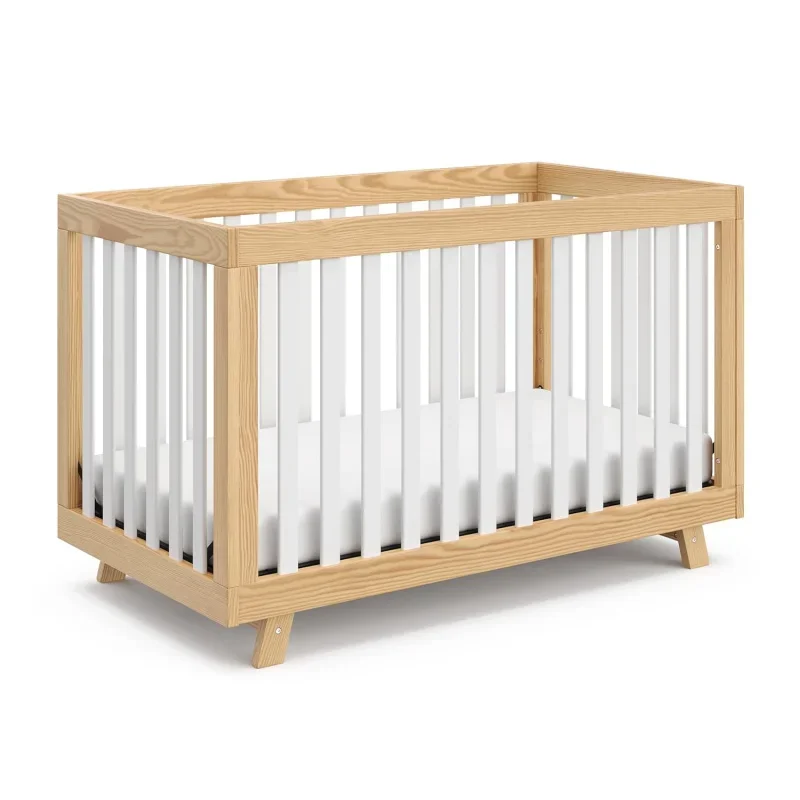Immediate Actions to Take After the Fall
When your baby falls from the bed, it is crucial to stay calm but act swiftly. Here’s what you need to do immediately after the incident:
- Firstly, gently pick up your baby. Support their head and neck to avoid further injury.
- Inspect their body softly for any signs of injury, like swelling or unusual positioning.
- Calm your baby with soothing words and gentle touch. A calm baby is easier to assess.
- Do not shake your baby in an attempt to ‘wake’ them, as this can cause further harm.
- If your baby is not moving or appears unconscious, avoid moving them more than necessary and call emergency services immediately.
- Even if there are no visible signs of injury, monitor your baby closely for any changes in behavior or alertness for the next few hours.
Remember, a baby fell from bed can be frightening, but taking the right actions quickly can reduce the risk of serious injury. Stay vigilant and provide comfort until you’re certain they are safe and unharmed.

Assessing Your Baby’s Condition
After your baby fell from bed, assessing their condition is vital. Check your baby’s consciousness first. If they’re awake, look for signs of pain or distress. Notice if they cry or make noises, which could signal discomfort. Next, observe their breathing. Ensure it’s normal and not too shallow or too rapid. Then, visually inspect their body. Look for any obvious signs of injury, such as cuts, bruises, or bumps. Pay extra attention to their head, as babies have delicate skulls.
Be gentle but thorough. Move your baby’s limbs carefully to see if they react with pain. If your baby seems unusually sleepy or drowsy after a fall, this could be a cause for concern. Also, check for signs of nausea or vomiting, which could indicate a head injury. Watch out for abnormal eye movements or if one pupil is larger than the other, which requires immediate medical attention.
Lastly, keep an eye on their behavior. Is your baby less active than usual? Are they feeding well? Any change in their usual habits may need a closer look. If in doubt, it’s always best to consult a pediatrician, even if your baby seems fine. They are trained to spot subtle signs of injuries that might not be immediately evident. Remember, staying observant and acting promptly are key to ensuring your baby’s well-being after a fall.
When to Call a Doctor
Deciding when to call a doctor after your baby fell from bed is crucial. Immediate medical advice is necessary if you notice any of the following symptoms after the fall:
- Unconsciousness or semi-consciousness: If your baby doesn’t wake up or seems unusually lethargic, seek medical help immediately.
- Persistent crying: Continuous crying or distress could indicate pain or discomfort.
- Physical abnormalities: This includes issues like trouble breathing, bleeding, or strange postures.
- Seizures: Any form of convulsion is a serious sign that requires immediate attention.
- Vomiting or refusal to feed: Both could be signs of internal issues post fall, particularly a head injury.
If your baby falls from the bed but appears well, keep a close watch on them. If you observe any changes in their behavior or physical condition, do not hesitate to consult a pediatrician. When in doubt, it’s always safer to get a professional opinion to ensure your baby’s health is not at risk.

Common Injuries from Falling and Their Symptoms
When a baby falls from bed, common injuries can occur, some of which may not be immediately noticeable. It’s essential for parents to be aware of these and to monitor for symptoms that could indicate a more serious problem. Here are some injuries that babies might suffer from a fall and the signs to look out for:
- Head Injuries: The most concerning injury is to the head. Symptoms include vomiting, drowsiness, swelling at the site of impact, or a change in sleep patterns. Also look for clear or bloody discharge from the nose or ears or any change in the baby’s crying pitch.
- Fractures: Babies have delicate bones. A break might show through swelling, redness or the baby may refuse to move a limb. If you suspect a fracture, it’s essential to get medical attention right away.
- Bruises and Scrapes: Appear as discolored skin or cuts. While they may not be serious, they can be painful. A cold compress can help reduce swelling and discomfort.
- Soft Tissue Injuries: Such as sprains or strains, can cause swelling and discomfort. Your baby might be more fussy or cry when you touch the affected area.
- Internal Injuries: Some signs include abdominal tenderness, vomiting, or blood in the stool. These symptoms are a signal to seek immediate medical attention.
If your baby fell from bed and exhibits any of these symptoms, or if you’re in doubt about their condition, it is important to contact a healthcare provider. Early detection of injuries can greatly affect the outcome, so it’s crucial to stay alert to your baby’s cues and seek professional advice when necessary.
Preventing Future Falls
Ensuring your baby’s safety is a paramount concern for any parent, especially after a baby fell from bed. Taking steps to prevent future incidents is both practical and essential. Here are some strategies to help safeguard your little one:
- Secure the Sleeping Area: Use bed rails or guards on beds that are not designed for infants. This can prevent your baby from rolling off.
- Floor Cushioning: Place thick rugs or soft mats around the bed. These can lessen the impact if your baby does take a tumble.
- Proper Supervision: Never leave your baby unattended on an elevated surface. Always keep an eye out when they’re on the bed or changing table.
- Low-Profile Bedding: Consider switching to a mattress on the floor. This minimizes the distance of a fall and the potential for injury.
- Remove Hazards: Keep the area around the bed clear. Remove objects that could cause injury or that your baby could roll onto.
- Sleeping Position: Always place your baby on their back to sleep. Ensure they are well away from the edge of the bed.
- Crib Safety: Ensure your baby’s crib meets all safety standards. It should have a tight-fitting mattress and no loose bedding.
- Education and Awareness: Educate caregivers and family members about these safety measures. Make sure everyone knows how to prevent falls.
Taking these preventative steps can drastically reduce the chances of another fall. Always remember to stay vigilant and prioritize your baby’s safety in all situations.
Coping with Guilt as a Parent
After your baby fell from bed, feeling guilty is a normal reaction for any parent. However, it’s crucial to manage these emotions for your well-being and your baby’s. Here are some steps to help you cope with the guilt:
- Acknowledge Your Feelings: It’s okay to feel upset or guilty, but don’t let these feelings overwhelm you. Recognize them and then shift your focus to taking care of your child.
- Learn from the Experience: Use the incident as a learning opportunity. Reflect on how the fall happened and what you can do to prevent it in the future.
- Talk to Someone: Sharing your experience with a partner, friend, or family member can help ease the burden. They may offer support and understanding, which can help you forgive yourself.
- Focus on Care: Prioritize your baby’s recovery and well-being. Staying attentive to your baby’s needs can help shift your focus from guilt to care.
- Seek Professional Help: If guilt is affecting your daily life, consider talking to a therapist or counselor who specializes in parental issues.
- Join a Support Group: Connecting with other parents who have faced similar situations can provide comfort and perspective.
- Give It Time: Healing emotionally takes time. Be patient with yourself and allow the guilt to diminish as you move forward.
Remember, accidents happen and they do not reflect your love or care for your baby. Stay positive and focus on creating a safe environment for your little one. Seek help if needed and keep moving forward.

Monitoring Your Baby Post-Fall
After your baby fell from bed, continuous monitoring over the next few days is crucial. Careful observation can help detect any delayed symptoms that may arise as a result of the fall. Even if your baby appeared fine immediately after the incident, it’s important to stay vigilant for any late-appearing signs. Here are key points to keep in mind while monitoring your baby post-fall:
- Watch for Changes in Behavior: Is your baby more irritable than usual or showing a lack of interest in their favorite toys? Changes in behavior can signal discomfort or pain.
- Sleep Patterns: Monitor your baby’s sleep. More or less sleep than normal could indicate a problem.
- Feeding Habits: A reduction in appetite or difficulty during feeding times might suggest your baby is experiencing discomfort. Keep a close eye on their eating patterns.
- Physical Symptoms: Continue to check for any swelling, bruising, or redness that may develop after the fall. Delayed swelling, especially on the head, needs prompt medical attention.
- Cognitive and Motor Skills: Ensure your baby is reaching for objects and interacting as usual. Any regression or reluctance to crawl, sit, or stand should be noted and discussed with a doctor.
- Mood Swings or Crying: Look out for any increase in fussiness or unexplained crying. This could be a sign your baby is in distress.
If you notice any of these signs, or if something seems ‘off’ with your baby, it’s better to err on the side of caution and consult your pediatrician. Remember, your intuition as a parent is powerful. Trust it and seek advice when you feel it’s needed. The wellbeing of your baby is paramount, and prompt attention can make all the difference.
Professional Advice and When to Seek Help
Seeking professional advice is vital after your baby fell from bed. Here’s when and how to seek help:
- Immediate Concerns: If your baby shows any severe symptoms like unconsciousness, abnormal breathing, or seizures, call emergency services right away.
- Continuing Symptoms: Should milder symptoms like persistent crying, refusal to feed, or unusual sleep patterns persist, contact your pediatrician. They can provide tailored advice and necessary interventions.
- Uncertainty: If you’re unsure about your baby’s condition, it’s better to consult a doctor. They can rule out any potential complications.
- Routine Check-Up: Even if your baby appears fine, schedule a follow-up with your pediatrician. They can ensure no injuries were overlooked initially.
- Mental Health Support: If you experience overwhelming guilt or anxiety, consider speaking to a mental health professional. They can offer support and coping strategies.
It’s crucial to act swiftly and get professional advice to ensure the well-being of both you and your baby after such incidents.
